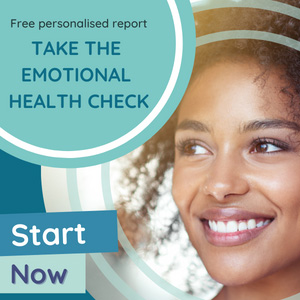If you've ever experienced anxiety, or you'll be aware of the intense emotional impact this can have on your life. Anxiety can build up gradually over time or even happen suddenly because of a changing event, trauma or even illness. It causes tension, chronic worry and even physical changes like increased blood pressure, chest pains and dizziness.
It makes every day life a struggle and affects how you interact with the world - often avoiding things and situations out of worry. The good news is, change is possible, in this blog I explain why we suffer with anxiety and how hypnotherapy actually works to help you overcome it.
How does hypnotherapy work for Anxiety video
Watch my explainer video and learn how hypnotherapy can help you ease your anxiety and start living life to the full again.
What is anxiety and why do we get anxious?
Well, if we look back to our ancestors in primitive times the root of anxiety is all about survival. Because anxiety is essentially the emotion that keeps us alive - it's our body's natural response to stress, and it's what kept us alert to danger in primitive times when we were dragging food back to our caves, competing with other tribes - more aware than ever of surroundings and how much danger we could be in.
And so by worrying about the potential threats we may face ahead of time, we would have been prepared to fight or run away! So, anxiety is what helped us survive and eventually thrive, evolving into modern day humans as we evolved to protect ourselves.
These days, if our brains perceive a threat or danger, either real or imagined, its releases hormones to prepare us to run away, fight or freeze. Stress hormones like adrenaline and cortisol, which make you feel more vigilant. They also make your heart beat faster, so blood is sent where it's needed the most, when we're under attack.
The problem, is our society has evolved a lot quicker than our brains, and sometimes the system gets activated when there is no physical danger! So, it responds in the only way it knows how - as if it's being chased by a bear. It means we end up internalising the feelings about our situation, we find our hearts pounding at the thought of having to do something new or challenging, with no idea how to make it stop.
Anxiety becomes a mental health issue when it gets in the way and affects your daily life. There may be certain things which act as a trigger - or you just have a constant level of anxiety and stress hormones throughout the day.
The ongoing worry or fear of anxiety can feel completely debilitating - it can affect you emotionally and physically - so you may notice symptoms such as rising panic, stomach cramping, sweating, headaches, chest pains, problems sleeping, nausea, and even teeth grinding. If you're suffering with anxiety these issues feel very real and even scary at times, which continues to create more internal anxious thoughts and feelings.
What are the common types of anxiety disorders?
If you recognise any of these symptoms, it's important to take action, because they can lead onto more specific issues and disorders, but here are 3 of the most common anxiety disorders:
1. Generalised Anxiety Disorder
It leaves you feeling anxious and worried about almost any situation rather than anything specific, trapped in a cycle of negative thinking.
2. Social Anxiety
A persistent, overwhelming fear of social situations, leaving you fearful of engaging with people in everyday activities, such as shopping or speaking on the phone. It causes you to worry excessively about dealing with people before, during and after the situation.
3. Panic Disorder
Often a common issue with anxiety disorders, it can leave you feeling out of control producing very real physical symptoms, from a rapid increase in heartbeat to a churning stomach sensation. These physical symptoms are naturally unpleasant which often sets off a cycle of worry and fear about the experiencing a further panic attack.
How can you calm anxiety down?
There are lots of things people try before we work together in hypnotherapy sessions which help to calm themselves and the anxiety down, for example:
- 7 - 11 breathing, where you breathe out for longer than you breathe in. This calms your sympathetic, 'fight or flight' response, and engages your parasympathetic, 'rest and digest' system. Simple, but powerful.
- Progressive muscle relaxation - tensing and relaxing different groups of muscles. It's all too easy not to notice how tension is rising in our body, and this technique allows us to recognise it, and consciously let it go.
- Meditation and mindfulness are powerful tools for managing anxiety - they allow you to be 'in the moment', noticing any difficult thoughts or emotions, but not getting involved in them - acknowledging them, but letting them flow past like twigs in a river current.
- Accepting that a thought exists, without accepting that it's right. Or even challenging those thoughts - where's the evidence? Or replace them with new coping thoughts.
- Journaling and writing down your anxieties then evaluating how likely they are to happen, and what you can do about it, can really help gain perspective.
How does hypnotherapy work for anxiety?
In my therapy practice, I use Solution Focused Hypnotherapy, it's a powerful combination of talking therapy with hypnosis. I also help clients understand that the symptoms of anxiety are complete normal response to stress - and so brain-based therapy is an integral part of the process because it helps you understand why you are feeling a certain way and what we can start to do about it.
So, in Solution Focused Hypnotherapy you'll learn how the mind is working in a very simply way - you'll find out more about the two parts of your brain (intellectual and primitive part are affected by the stress response allowing the anxiety to take over). It's important because all the thoughts we have in life as we experience real or imagined threats raise our anxiety levels, and it can become overwhelming if we're not able to find a way of managing it in our day to day life.
So, Solution Focused Hypnotherapy can help you reduce your internal anxiety and stress naturally and we work together to help you'll gain more perspective and learn to process anxieties in a better way without resorting to all the unhelpful coping strategies of the past. Gaining a new perspective can help you sleep better and make better positive life choices such as taking that exercise and changing your eating habits.
You'll also learn how to harness your imagination is more helpful ways to reduce your stress levels or being held onto and increase your positive experiences and daily life by helping you find ways to become more physically active and re-engage with the people and things that you normally enjoy.
Most importantly, we'll focus on how you want to be. What will be different for you when you feel more in control of your thoughts and feelings. It means we don't dwell on the past and keep things nicely positive!
Hypnosis for Anxiety
Once we've finished talking, we use hypnosis or 'trance' - an opportunity for you to relax deeply and consolidate our discussion. As you listen, you'll be asked to imagine certain things which produce a hyper-relaxed state of focus engaging your subconscious brain to hard-wire the changes we've discussed.
It's a bit like guided day dreaming where you can hear everything that's being said whilst remaining in control and it's a pleasant way to switch off your 'anxiety state or fight or flight' for half an hour, to give you space to consider other responses, while, over time, the positive suggestions made allow you to begin building new, more constructive neural pathways in your brain, to help you think and behave more positively.
As with anything, creating lasting positive change requires some practice and repetition, so you'll often need a number of hypnotherapy sessions to create the change you're looking for.
Living with anxiety can be struggle, but change is possible. If you'd like to overcome your anxiety, I would love to help. Start by getting in touch to book your initial session where we can fully discuss your situation and tailor a hypnotherapy program to support your positive changes.







